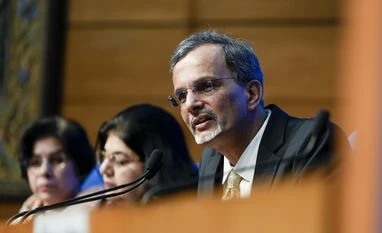‘Get out of the way’
In 1987, US President Ronald Reagan is believed to have said: “I was asked some time ago what the difference is between a small business and a large business, and I said a large business is what a small one would be if the government would get out of the way.”
The Economic Survey borrowed Reagan’s concept of limited government intervention and applied it twice in different contexts.
“Get out of the way and trust people, we must, for we have no other choice. ‘Business as usual’ carries a high risk of economic stagnation, if not outright stagnation. Yes, trust is a two-way street, and the non-government actors in the economy must justify the trust placed in them,” the Survey observed.
In another instance, the Survey remarked: “Governments must get out of the way of women joining the workforce.”
More than words
While Chief Economic Advisor V Ananth Nageswaran doesn’t invoke any shlokas in the latest Economic Survey, unlike the last one where he quoted the Ishopanishad, he closes his preface to the Survey with the following words: “As always, putting it all together is a labour of love and a yagna. Making the changes happen in reality is a sadhana.”
However, the Survey is filled with quotable quotes.
Quoting the Chinese proverb, “May we live in interesting times!” the Survey noted that it is especially relevant in today’s turbulent world.
In the context of climate transition, the Survey referenced American mathematician and meteorologist Edward Norton Lorenz, who, in a 1972 paper, famously wondered, “Does the flap of a butterfly’s wings in Brazil set off a tornado in Texas?”
Quoting one of John Maynard Keynes’ seminal works, The Economic Consequences of the Peace, where he discussed early 20th-century Londoners, the Survey remarked that the situation is “not unlike the one we’ve grown accustomed to over the past few decades of hyper-globalisation, wherein the flows of capital, goods, services, and people have transformed our world, aided by the spread of new technologies and ideas”.
The dragon’s growing shadow
The 436-page Economic Survey for 2024-25 mentions China 101 times, slightly down from 132 in the previous Survey. In a section titled ‘The Elephant and Dragon in the Room’, the Survey notes that China’s resurgence was predicted in 1904 by British geographer and diplomat Halford Mackinder.
Mackinder is believed to have warned that a rising China could one day pose the greatest threat “to the world’s freedom”, because it could combine “oceanic frontage” on the Pacific with “the resources of the great continent” of Eurasia.
Sowing seeds of success
The Economic Survey praised Maha Farmers Producer Company, a state-level producer company in Maharashtra, for empowering 646 farmer producer organisations to procure and sell agricultural products, including pulses and perishable items. In 2022, it became Maharashtra’s largest procurement channel, benefiting over 170,000 farmers.
Highlighting success stories in waste management, the Survey spotlighted Erattayar grama panchayat in Kerala and Nadep (Narayan Deotao Pandharipande) composting in Chhindwara, Madhya Pradesh. The Erattayar grama panchayat example includes door-to-door collection, resource recovery, and recycling, reaching over 4,600 households and 500 institutions. Nadep composting, a method of organic composting that produces fertiliser from organic materials, has focused on biodegradable waste management and established waste management infrastructure in 784 gram panchayats and 1,898 villages.
)

)